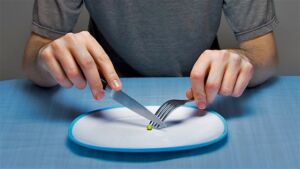What is eating disorder
An eating disorder is a serious condition characterized by unhealthy eating habits that can involve either too much or too little food, as well as obsessive thoughts and behaviors related to body weight, shape, or food. These disorders are often driven by underlying psychological factors such as anxiety, depression, low self-esteem, or trauma. They can lead to severe physical and emotional consequences if not treated properly.

Common Types of Eating Disorders:
- Anorexia Nervosa
- Overview: Characterized by extreme restriction of food intake due to an intense fear of gaining weight. Individuals often see themselves as overweight even if they are dangerously underweight.
- Symptoms: Drastic weight loss, obsession with food/calories, refusal to maintain a healthy weight, distorted body image.
- Health risks: Malnutrition, heart problems, bone loss, and potentially life-threatening complications.
- Bulimia Nervosa
- Overview: Involves episodes of binge eating (eating large amounts of food) followed by behaviors to prevent weight gain, such as vomiting, excessive exercise, or laxative use.
- Symptoms: Eating in secret, frequent trips to the bathroom after meals, tooth decay, dehydration, and fluctuating weight.
- Health risks: Electrolyte imbalance, gastrointestinal issues, heart complications.
- Binge Eating Disorder
- Overview: Characterized by recurrent episodes of eating large quantities of food in a short period of time, often to the point of discomfort, without subsequent purging behaviors.
- Symptoms: Eating even when not hungry, eating in secret, feelings of guilt or shame after eating.
- Health risks: Obesity, heart disease, diabetes, high blood pressure.
- Avoidant/Restrictive Food Intake Disorder (ARFID)
- Overview: Avoidance of certain foods based on texture, taste, or fear of choking, often leading to nutritional deficiencies and significant weight loss.
- Symptoms: Limited variety in food choices, reluctance to eat certain foods, and physical symptoms like malnutrition without fear of weight gain.
- Health risks: Growth problems in children, malnutrition, developmental delays.
- Other Specified Feeding or Eating Disorder (OSFED)
- Overview: Eating disorders that don’t fit the criteria of the above categories but still involve disordered eating patterns and serious health risks.
- Symptoms: A mix of symptoms from different eating disorders but not to the degree required for a full diagnosis of anorexia, bulimia, etc.
- Health risks: Varied based on the specific behaviors and symptoms.
Causes of Eating Disorders
Eating disorders typically develop due to a combination of factors, including:
- Genetic predisposition: A family history of eating disorders, depression, or anxiety may increase the risk.
- Psychological factors: Low self-esteem, perfectionism, trauma, or difficulty handling emotions.
- Cultural pressures: Societal emphasis on thinness or unrealistic body ideals.
- Biological factors: Imbalances in brain chemistry, hormones, or gut-brain interactions.
- Eating Disorders; What is eating disorders (e.g., anorexia, bulimia, binge eating).
- Traditional treatments include, Psychotherapy, Cognitive-behavioral Therapy (Psychology), and medication.
- One of the oldest, yet newest form of holistic therapeutic approach is Hypnotherapy as a alternative approach to healing that is more direct in uncovering and overcoming the causation.
How Hypnotherapy Helps with Eating Disorders
- Hypnotherapy works to address underlying emotional triggers (e.g., trauma, self-esteem issues, negative body image).
- Hypnotherapy also help to change eating behaviors, by reduce or removing the triggers such as anxiety, stress, loneliness, body dysmorphia, etc.
- Hypnotherapy is known to help reduce compulsive behaviors and encourage a positive body image.
What is Hypnotherapy?
- To understand Hypnotherapy, let us first define hypnosis. Hypnosis; a highly focused, altered state of awareness that bypasses the critical faculty, while selective thinking is maintained.
- Hypnotherapy: In Hypnotherapy the client induced into an altered state of awareness (Hypnosis) then therapeutic techniques are used to overcome a wide variety of issues, including eating disorders.
- There are many different methods of inductions and therapeutic approaches. The therapeutic approach and induction type used is based on the clients and their needs
- Therefore, Hypnotherapy is the fastest and most powerful therapeutic tool known to man that taps into the subconscious mind to create desired change.
Key Techniques Used in Hypnotherapy for Eating Disorders
- Visual imagery: Guiding the patient to visualize healthy behaviors around eating and body image.
- Regression therapy: Helping patients explore past experiences that may contribute to disordered eating habits.
- Sub-cognitive reframing, rewriting negative self-talk and thought patterns within the subconscious mind, changing them into positive, healthier beliefs.
- Relaxation of the critical faculty or the conscious mind through the process of induction. When that is achieved and the client is in the state of hypnosis, the therapeutic process can start.
- In addition to the therapeutic methods, the hypnotherapist may install tool within the subconscious mind of the client to allow the client to have control, and over time. will be able to turn down or turn off triggers that drives their issues. The hypnotherapist will also Teaching clients to manage the triggers without turning to disordered eating as a coping mechanism.
Limitations and Considerations
- While Hypnotherapy is not magic, it is a powerful standalone therapy for everyone, and, perfect adjunct to traditional medicine, and cognitive therapeutic methods.
- Not all Hypnotherapists are the same. It is importance of finding a qualified, experienced hypnotherapist. One that has a minimum of 350 hours of training. One that is a Certified Clinical Hypnotherapist.
Conclusion
- Hypnotherapy is the most powerful tool to create change within the subconscious mind
- Hypnotherapy is known to help with eating disorders by reducing or removing the triggers such as anxiety, stress, loneliness, body dysmorphia, etc., and reduce compulsive behaviors and encourage a positive body image.
- Invite readers to share their thoughts or ask questions about hypnotherapy call 239-692-9988.
- Advanced Hypnotherapy of Naples has some of the most experienced, best qualified Certified Clinical Hypnotherapists in the state of Florida.
- Peter Williams, the director of Advanced Hypnotherapy of Naples, has been in Practice since 2009, He has had over 1200 hours of training. Give him a call today 239-692-9988, or click the link below, book an appointment and save 20%. https://advancedhypnonaples.com/booking/



